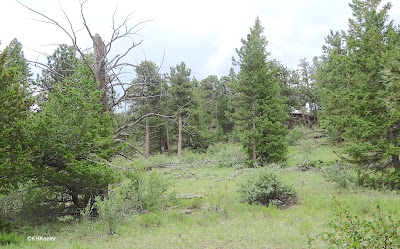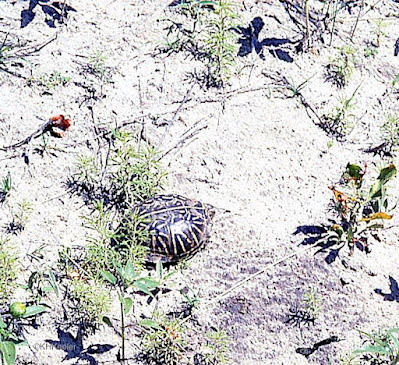I ran a study of the western harvester ant, Pogonomyrmex occidentalis, from 1977 to 2019, 42 years. Most scientific studies are done in two or three field seasons, which represents the time students have for a project and the need for professionals to show results. Some topics need longer and get it. Academic careers are about 40 years, so if started the year the scientist was beginning, 40 years is about the limit, unless a second person picks up the project. But people willing and able to do long-term studies are rare. In the case of the harvester ant study, retired well before I finished the harvester ant project.
 |
| western harvester ant (Pogonomyrmex occidentalis) colony They can live 40 years. |
1) You cannot control time. With adequate funding, we can replicate everything but time. You can get lots of samples all over the map, in all seasons, if you can pay for it. But no amount of money or willpower will give you additional years (except waiting) and never a survey of the site the year before you started.
 |
| bush morning glory, Ipomoea leptophylla they can live 100 years |
2) Long-term studies are hard to maintain. Interest wanes: if you act on that, by cleaning up the study area and removing tags, it is difficult to restart. Environmental studies almost always stick markers in the ground or on the organisms of interest and good stewardship removes all of those when the project is over. In the case of my ant study, that was true while the tags mattered; now with GPS for each colony, you can find the same spot after a few years. But often there are details that are difficult to reproduce after cleaning up. Frequently it is easier to start a new long-term study than figure out how to continue one that was discontinued.
3) Science advances. My study had inadequate replication because all the colonies were in the same area, sharing, at very least, weather, but in 1977 I thought I was doing a good job of experimental design. Not only do individuals learn, best practice standards in every field change. I don't know what would be different in 15 years if I set out a well-designed study today, but probably several things, so that in 2037 the design of 2022 will look badly planned.
 |
| Montane zone in the Rocky Mountains. Ponderosa pines can live 500 years, most of the other trees in the ecosystem are similarly long-lived. |
4) Sometimes even the paradigms change. Paradigm is defined as "typical example or pattern of something; a model." What I mean for ecology is the underlying view of the world. When I started the harvester ant study in 1977, the wild world was seen as stable. Yes, glaciations happened, but that kind of climate change was more than 8,000 years ago and expected to be more than 8,000 years--more like 100,000--years in the future. In that model, a study of the dynamics of harvester ants, even if it took 40 years, would give us understanding of how harvester ant populations have worked for at least the last 500 years and for the next 500. But, in the last 50 years, global warming has gone from being unthought of, to a prediction, to a reality. (Actually, warming has been happening all 50 years, but the ecological community had not noticed in 1977). So. now, it is hard to say what projects started under the old paradigm (the natural world can be treated as stable because change is so slow) tell us under the new paradigm (the whole world is warming and has in no way reached its warmest point).
 |
| western box turtle, Terrapene ornata in the Nebraska sandhills They live 25-35 years in the wild, to 100 in captivity |
Despite the problems, for long-lived animals and plants and community effects that require decades not years, long term studies are essential and wonderfully valuable I urge you to do longterm studies if you have questions that need them but I predict you'll encounter some, maybe all, of the surprises above.
Comments and corrections welcome.
Relevant links in this blog:
Harvester ant project link
Other thoughts on long-term studies link
That is awesome! I wonder what you would say about recording your observations?
ReplyDeleteThanks for the question; I'll pull together what I learned into a post in the next couple of weeks.
Delete